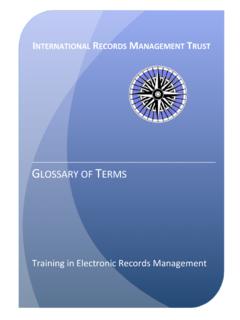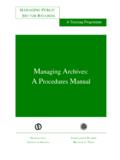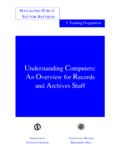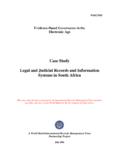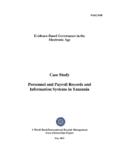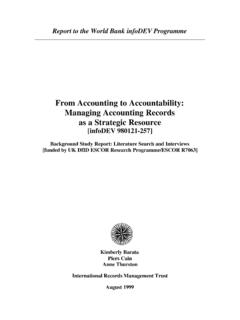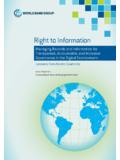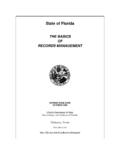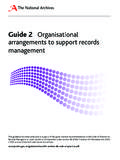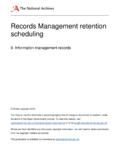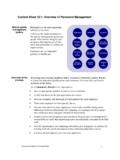Transcription of A Training Programme - International Records …
1 MANAGING PUBLIC SECTOR Records A Training Programme Preserving Records International COUNCIL ON ARCHIVES International Records management TRUST MANAGING PUBLIC SECTOR Records : A STUDY Programme PRESERVING Records MANAGING PUBLIC SECTOR Records A STUDY Programme General Editor, Michael Roper; Managing Editor, Laura Millar PRESERVING Records International Records International management TRUST COUNCIL ON ARCHIVES MANAGING PUBLIC SECTOR Records : A STUDY Programme Preserving Records International Records management Trust, 1999. Reproduction in whole or in part, without the express written permission of the International Records management Trust, is strictly prohibited. Produced by the International Records management Trust 12 John Street London WC1N 2EB UK Printed in the United Kingdom.
2 Inquiries concerning reproduction or rights and requests for additional Training materials should be addressed to International Records management Trust 12 John Street London WC1N 2EB UK Tel: +44 (0) 20 7831 4101 Fax: +44 (0) 20 7831 7404 Email: Website: Version 1/1999 MPSR Project Personnel Project Director Anne Thurston has been working to define International solutions for the management of public sector Records for nearly three decades. Between 1970 and 1980 she lived in Kenya, initially conducting research and then as an employee of the Kenya National Archives. She joined the staff of the School of Library, Archive and Information Studies at University College London in 1980, where she developed the MA course in Records and Archives management ( International ) and a post-graduate research Programme .
3 Between 1984 and 1988 she undertook an onsite survey of record -keeping systems in the Commonwealth. This study led to the foundation of the International Records management Trust to support the development of Records management through technical and capacity-building projects and through research and education projects. General Editor Michael Roper has had a wide range of experience in the management of Records and archives. He served for thirty-three years in the Public record Office of the United Kingdom, from which he retired as Keeper of Public Records in 1992. He has also taught on the archives courses at University College London and the University of British Columbia, Canada. From 1988 to 1992 he was Secretary General of the International Council on Archives and since 1996 he has been Honorary Secretary of the Association of Commonwealth Archivists and Records Managers (ACARM).
4 He has undertaken consultancy missions and participated in the delivery of Training programmes in many countries and has written extensively on all aspects of Records and archives management . Managing Editor Laura Millar has worked extensively not only as a Records and archives management consultant but also in publishing and distance education, as an editor, production manager and instructional designer. She received her MAS degree in archival studies from the University of British Columbia, Canada, in 1984 and her PhD in archival studies from the University of London in 1996. She has developed and taught archival education courses both in Canada and internationally, including at the University of British Columbia, Simon Fraser University and the University of Alberta.
5 She is the author of a number of books and articles on various aspects of archival management , including A Manual for Small Archives (1988), Archival Gold: Managing and Preserving Publishers Records (1989) and A Handbook for Records management and College Archives in British Columbia (1989). Project Steering Group Additional members of the Project Steering Group include Association of Records Managers and Administrators (ARMA International ): Hella Jean Bartolo International Council on Archives: George MacKenzie Project management Consultant: Tony Williams University College London: Elizabeth Shepherd Video Production Co-ordinator: Janet Rogers Educational Advisers Moi University: Justus Wamukoya Universiti Teknologi Mara.
6 Rusnah Johare University of Botswana: Nathan Mnjama University of Ghana: Harry Akussah, Pino Akotia University of New South Wales: Ann Pederson University of West Indies: Victoria Lemieux Project Managers Lynn Coleman (1994-6) Laura Millar (1996-7) Elizabeth Box (1997-8) Dawn Routledge (1999) Production Team Additional members of the production team include Jane Cowan Nicki Hall Greg Holoboff Barbara Lange Jennifer Leijten Leanne Nash Donors The International Records management Trust would like to acknowledge the support and assistance of the following: Association of Records Managers and Administrators (ARMA International ) British Council British High Commission Ghana British High Commission Kenya Caribbean Centre for Development Administration (CARICAD) Canadian International Development Agency (CIDA) Commonwealth Secretariat Department for International Development (East Africa) Department for International Development (UK) DHL International (UK)
7 Limited Foreign and Commonwealth Office Human Rights Fund Hays Information management International Council on Archives Nuffield Foundation Organisation of American States Royal Bank of Scotland United Nations Development Program Preserving Records Principal Authors LAURA MILLAR AND MICHAEL ROPER For information on Laura Millar, see her biography above as Managing Editor. For information on Michael Roper, see his biography above as General Editor. Contributor Michael Cook Reviewers Roger Craig, Cayman Islands National Archive Stephen Yorke, National Archives of Australia Testers National Archives of Antigua and Barbuda National Archives of Fiji University of Legon, Ghana CONTENTS Introduction 1 Lesson 1 Records and Archives.
8 Causes of Deterioration and Methods of Control 10 Lesson 2 Planning a Preservation Programme 33 Lesson 3 Storage and Handling of Materials in Different Media 86 Lesson 4 Reprography 110 Lesson 5 Security 133 Lesson 6 What to Do Next? 149 FIGURES 1. Physical and Environmental Monitoring Survey Report Form 42 2. Preservation Evaluation Questionnaire 50 3. Treatment Worksheet 57 4.
9 Archives Location Register 65 5. Annual Stocktaking Report Form 79 6. Model Reference Rules 139 PRESERVING Records 1 INTRODUCTION INTRODUCTION TO PRESERVING Records Preservation is a crucial element in the whole operation of a Records Programme . The aim of archival preservation is to prolong the usable life of useful research information in two ways. First, preventive preservation seeks to reduce risks of damage and to slow down the rate of deterioration. This aim is usually accomplished by selecting good quality materials and by providing suitable storage environments and safe handling procedures. Secondly, prescriptive preservation is a means of identifying and treating or copying damaged materials to restore useful access to the information.
10 In the course of their work, record -keeping staff and researchers handle books, documents and Records that collectively form a significant proportion of the nation s cultural heritage. It is important to recognize the fragility of much of this material, especially of paper-based Records created since the 1830s. Around this time ground wood pulp and alum-rosin size started to be added during paper manufacture, factors that resulted in a legacy of built-in deterioration. Today, we face new challenges in managing an ever greater variety of electronic materials, all of which must be protected from alteration, damage and technical obsolescence. A variety of methods exist to protect Records physically and ensure their stability and security.
